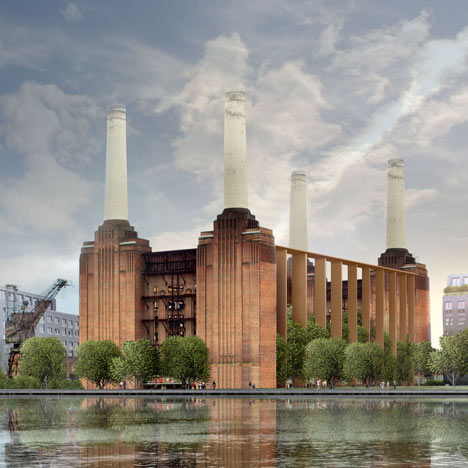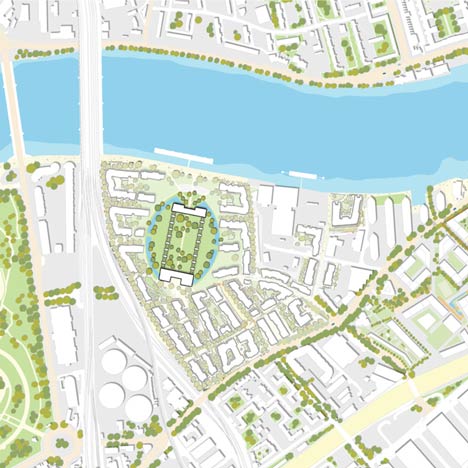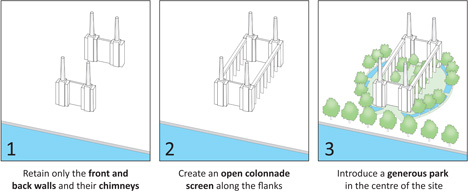
Farrells releases alternative proposals for Battersea Power Station
British architect Terry Farrell has unveiled conceptual proposals to convert London’s Battersea Power Station into a park, which oppose existing plans for a mixed-used development by New York architect Rafael Viñoly.
Unlike Viñoly, whose stalled proposals to develop the Grade II listed former power station require a significant investment, Farrell intends simply to replace the sides of the building with an open colonnade and create a public park inside.

The architect hopes that these alternative plans will enable the construction of a new underground station for a fraction of the cost projected for it in Viñoly’s scheme.

We published some of Viñoly’s originals plans for the site back in 2008 - see our earlier story here.
Here's some more text from Farrells:
Farrells release radical proposals for Battersea Power Station
Terry Farrell & Partners have released proposals for Battersea Power Station which offer a radical rethink involving an incremental two step strategy for its future.
This fresh approach aims to combat the “bigness” that is blocking the project with a plan that doesn’t rely on starting with a £1.5 billion new tube station or the refurbishment of an enormous and deteriorating ex industrial building.
Sir Terry said; “We have to learn lessons from the problems that have thwarted previous attempts to redevelop this much loved landmark.”
The first lesson that informs Farrell’s proposal is that little will happen whilst there is still a gigantic ruin in the middle of the site. Flat sales, particularly on the riverfront, will not achieve full value if the power station is not dealt with first.
Farrell’s proposal is to create a simple and beautiful finished monument at a very early stage by retaining the front and back elements and their chimneys. From most river views this would retain the full convincing form of the building by constructing a grand muscular monument with an open colonnade screen along the two flank walls.
From the river, this will appear solid and retain the full grandeur of the buildings form. From the sides, however, it will be open so that within the site and from the surrounding flats there will be views through the colonnade into a large generous parkland for people to enjoy. Such a unique and stunning park could be used for leisure and occasional events as have already taken place here over the years.
As for the transport connections, for now we could spend a fraction of the amount it would cost for a new tube station on a surface tram link or a shuttle bus service to Vauxhall station. When the tube line is up and running, which could take many years, it can service the increased people traffic there. A second phase could then involve the reconstruction of the walls and the roof to contain what is considered to be viable and appropriate at that point in time.
Sir Terry, who is an Ex-Commissioner of English Heritage and Ex-Chair of their London Advisory Committee, said;
“This is a pragmatic and incremental approach to enable the redevelopment of this famous landmark sitting in one of the largest and most valuable regeneration sites in Central London. In many ways, this strategy is already on its way to being realised as there is one long flank wall missing as well as the roof itself.
It is not the first time the power station would have been taken down and put back together again. Not many people know that the chimneys were removed during the Second World War to prevent them being targets for German bombers before being replaced.
The key to this strategy is that it will be, and will be seen to be, complete at each stage so that the redevelopment project can get started and make positive and rapid progress.”